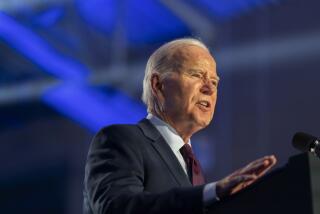Book review: ‘The Promise’ by Jonathan Alter
- Share via
Instant histories of presidential administrations based on privileged access to White House insiders have become so de rigueur that vetting the appropriate journalist/historian really ought to be part of every new chief executive’s transition process.
The author needs to be discreet enough to abide by the rules of high-level access and sympathetic enough to be open to the administration’s explanation of things, but sufficiently independent to produce a credible book. Barack Obama’s decision to open the White House to Jonathan Alter meets all three criteria, and in “The Promise: President Obama, Year One,” the longtime Newsweek columnist has produced a deeply reported, soberly appraised account of the president’s tumultuous first months in office through passage of healthcare reform.
Alter, a Chicago native, has known Obama since his days as a state senator and unsuccessful congressional candidate. He’s sympathetic to the president’s goals, casts a cold eye on his most vociferous political antagonists and is independent enough to criticize the administration’s — and the chief executive’s — shortcomings. As one would expect from a reporter of Alter’s experience, the book is rich in the kinds of insider detail that make for an entertaining, as well as informative, reading experience. Secretary of Defense Robert M. Gates, for example, is so trusted an advisor that his White House nickname is “Yoda,” while economic advisor Lawrence H. Summers’ outlook is so often grim that he’s known in the Oval Office as “Kevorkian.” There’s also fascinating note taken of the books read by officials in the administration and in the Pentagon and how these have influenced them at crucial junctures.
As the author of a fine history of Franklin D. Roosevelt’s first 100 days (that Obama admires), Alter brings an extremely useful perspective to this administration, which he believes inherited a breadth of crisis unparalleled since the 1930s. In a fireside interview near the end of 2009, Obama told Alter, “This is not a normal presidential situation that I find myself in. I mean, we have the most difficult set of challenges facing the country since the Great Depression. And that’s not hyperbole — it’s subject to objective proof.”
Alter credits Obama’s economic recovery plan for far greater success than is generally conceded, arguing that it rescued the country from the brink of depression, but fell short when it came to job creation and aiding distressed homeowners. He also argues that passage of the healthcare reform measure has earned Obama a place alongside FDR and Lyndon B. Johnson while conceding that the program’s real impact may be years away. By Alter’s account, the president chose to pursue that reform almost alone and against the strongest advice of his closest advisors.
The author convincingly faults the president, however, for his general failure to communicate his often subtle policy views to the American people, a surprising fault in the greatest White House orator since Ronald Reagan. Alter credits Obama with a dramatic, decisive assertion of civilian authority over the military that has gone largely — and unjustly — unnoticed.
When Obama forced a change of military commanders in Afghanistan, he also enforced a pause in nonessential operations while he convened what Alter calls the most intense, extended series of White House national security deliberations since the Cuban missile crisis. As the process unwound, the president and his chief aides became increasingly angry over leaks from the Pentagon that they thought were designed to push the president into agreement with the military’s leaders. The White House also became convinced that the Joint Chiefs’ chairman, Adm. Michael G. Mullen — the son of Bob Hope’s onetime Hollywood publicist — and his equally media-savvy ally, Gen. David H. Petraeus, were using the naive commander on the ground, Gen. Stanley A. McChrystal, as a political stalking horse. After sitting down alone with McChrystal, Obama came away even more convinced that he was a good commander being used by his superiors. The result was what Alter calls “a presidential dressing down unlike any in more than half a century.”
“In the first week of October, Gates and Mullen were summoned to the Oval Office, where the president told them he was ‘exceedingly unhappy’ with the Pentagon’s conduct. He said the leaks and positioning in advance of a decision were ‘disrespectful of the process’ and ‘damaging to the men and women in uniform and to the country.’ In a cold fury Obama said he wanted to know ‘here and now’ if the Pentagon would be on board with any presidential decision and could faithfully implement it.
“ ‘This was a cold and bracing meeting,’ said an official in the room.”
It also was a highly effective one. Gates pledged his conduct would change — “and it did.” Mullen and the rest of the generals “ ‘swore loyalty,’ said one senior civilian official. ‘And we chose to believe them.’ ”
This wasn’t the only time when the supremely controlled — rather icy — chief executive surrendered to justifiable (by Alter’s account) anger. When public rage mounted over Wall Street executives’ post-bailout bonuses, Obama became impatient with the defense that the payments were necessary to hold key people in place. “Obama later told a friend that the angriest he got as president in his first year was when he heard [CEO Lloyd] Blankfein” justify his compensation by saying “that Goldman [Sachs] was never in danger of collapse. That was flatly untrue,” Obama said.
“ ‘Let me get this straight,’ the president said.… ‘They’re now saying that they deserve big bonuses because they’re making money again. But they’re making money because they’ve got government guarantees….
“ ‘These guys want to be paid like rock stars when all they’re doing is lip-synching capitalism.’ ”
“The Promise” is the sort of solidly reported book that will provide readers with a full measure of instructive color to events that even those who closely follow the news think they know. There’s a great deal of interesting, if less significant detail, including where the president goes to sneak the odd cigarette and, more important, relations with and between the various members of his administration.
In his introductory chapters, Alter is modest about his abilities to discern the ultimate significance of the events he has reconstructed. Still, when it comes to what we’ve all come to call the first draft of history, “The Promise” is more polished — and far more thoughtful — than most. For those attempting to get a fix on the character of a fascinating but strangely elusive chief executive, it’s essential reading.
timothy.rutten@latimes.com
More to Read
Sign up for our Book Club newsletter
Get the latest news, events and more from the Los Angeles Times Book Club, and help us get L.A. reading and talking.
You may occasionally receive promotional content from the Los Angeles Times.







